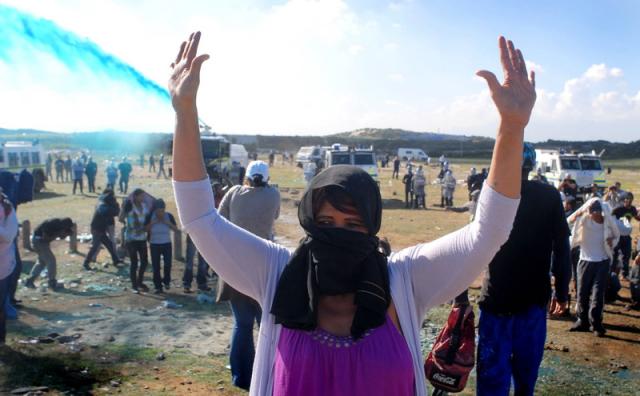http://westcapenews.com/?p=2960
The City of Cape Town’s Anti-Land Invasion Unit established to prevent the illegal occupation of city and provincial land, is acting unlawfully says Lawyers for Human Rights.

The Taflesig Land Occupation in Mitchell's Plain, May 2011
LHR lawyer Sheldon Magardie said the unit demolished structures without a court order and he was planning to approach the Cape High Court for an interdict to prevent the city from doing so.
“In our view, the city is acting unlawfully, because if someone occupies property, whether it is (an) illegal (occupation), or not, one still has to get a court order or legal authority such as a by-law to do so. And if there is such a by-law which allows them to demolish property without notice or fair procedure, that by-law is unconstitutional,” said Magardie.
He said the LHR had sent a letter to the city asking them which law the city was using to demolish structures without a court order, but had received no response.
The announcement by the LHR comes after violent clashes between backyarders and police last Sunday after over 4 000 backyarders occupied city-owned land in Tafelsig, Mitchell’s Plain on Saturday.
Police used water cannons, teargas and rubber bullets to disperse the backyarders, with reports that police were fired upon with live ammunition.
Sporadic clashes continued until Monday evening as backyarders continued to try to erect structures.
Eighteen suspects were arrested for public violence.
Mitchells Plain Backyarders Deputy Chairperson Shaheed Keet said the residents had come peacefully to squat on the land as people were tired of waiting for houses.
“We did not declare war on the city. All we need are houses. People have been on the waiting list for over 30 years,” he said, claiming the police’s attack was unprovoked.
“We received no warning from them. They did not even speak to us as a committee.”
He said they were trying to ascertain how many people had been injured.
Although an interdict preventing the erection of structures and occupation of the land was only obtained from the High Court on Tuesday – which the backyarders intend to appeal – City of Cape Town media manager Kylie Hatton said the unit acted in terms of the National PIE (Prevention of Illegal Eviction from and Unlawful Occupation of Land Act of 1998) Act.
“In terms of the PIE Act, the city may only dismantle structures that are unoccupied, as soon as a structure is legitimately occupied the city or a landowner must seek an eviction order from the courts,” she said.
However, Magardie said this was the city’s interpretation of the Act.
“Even if a structure is unoccupied, if someone is in possession of a structure, whether they are using it for living space or storage, one cannot dispossess someone of something that s/he possesses, unless you have legal authority,” he said.
The Anti-Land Invasion Unit, established in 2008, demolishes about 300 illegally erected informal housing structures per month, according to the city.
There are 340 000 applicants on the city’s housing database with about 40 000 migrants moving to Cape Town per year, according to official figures.
A visit to Tafelsig on Thursday revealed a field strewn with rocks, a few pieces of clothing, piles of wood and ashes.
In continuing protest, the backyarders continue to sleep on the open field.
Peter Bantam, his wife, brother in law and a few friends gather around a small fire to keep warm.
“They took everything, our blankets, pots and pans. There was no violence from our side. We were dodging bullets,” he said.
While Hatton said the city recognized the need for housing but “cannot allow people to illegally occupy vacant land or build informal structures”, residents in recognized informal settlements that have been in existence for years have also had their shacks torn down by the Anti-Land Invasion Unit after attempting to renovate them.
An X painted on a shack is often used by the city as a warning that the structure is illegal. In February, Khayelitsha resident, Nokwandisa Shukuma, spent R3000 replacing her old corrugated iron sheeting. She came home one afternoon to find a yellow X on her house. The next day, the Anti-Land Invasion Unit tore her home down.
A lack of communication between the city and the residents was cited as a major problem.
Informal Settlement Network community worker, Vuyani Mnyango said the city failed to inform community leaders of the city’s laws and did not respond to applications to renovate informal structures.
Khayelitsha (RR Section) resident’s committee secretary, Mandisa Selani, said since January this year 70 shacks in Khayelitsha’s RR Section were destroyed. She said that in January, a crèche in the area that was being renovated was destroyed without any warning.
She said the owner had received verbal permission from a city employee to go ahead with planned renovations. – Fadela Slamdien, West Cape News

